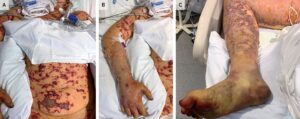In New England, a 19-year-old teenager lost his legs and fingers after consuming leftover noodles. This was a life-changing experience for him.
As per the information provided by the sources, in most cases, when a person eats the leftover food, they usually face stomach infection or any kind of short-term condition in different body types.
In the report, it has been mentioned that this case of this 19-year-old was reported in the New England Journal of Medicine in March 2021, and this case recently went viral in the entire globe. It was presented in a fictional portrayal in a YouTube video.
The man has eaten the noodle meal (lo mein), with the chicken and rice at the restaurant, it was the leftover, and after consuming the food, the man was alright for about 20 hours, after some time he started having the symptoms of the food-poisoning which also includes pain in stomach, nausea, and vomiting, mentioned in the report.

Afterwards, he was having chest pain, problems on breathing, blurry vision, and other severe symptoms.
Along with this, the findings in the report states, “Various episodes of emesis happened, with vomitus that was either bilious or red-brown. The abdominal pain, as well as the vomiting, were followed by the development of chills, generalized weakness, progressively deteriorating diffuse myalgias, chest pain, shortness of breath, headache, neck stiffness, and blurry vision.”
Furthermore, after some time, he was experiencing purplish discolouration of the skin and then was taken to the pediatric intensive care unit at the Massachusetts General Hospital.
The 19-year-old was having treatment for the shock, organ failure, skin mottling as well as a “rapidly progressive reticular rash” at the Massachusetts General Hospital.
In addition, the doctors cut off his legs below the knees and different parts of his fingers.
The man’s friend ate the same food, but he was totally fine.
According to the sources in New England, the teenager that was admitted to the health care centre for the treatment ” He had only got one of three doses of meningococcal conjugate vaccine without a booster and had also only had one dose of the serogroup B meningococcal vaccine out of two or three doses advised by the Centers for Disease Control and Prevention.”
